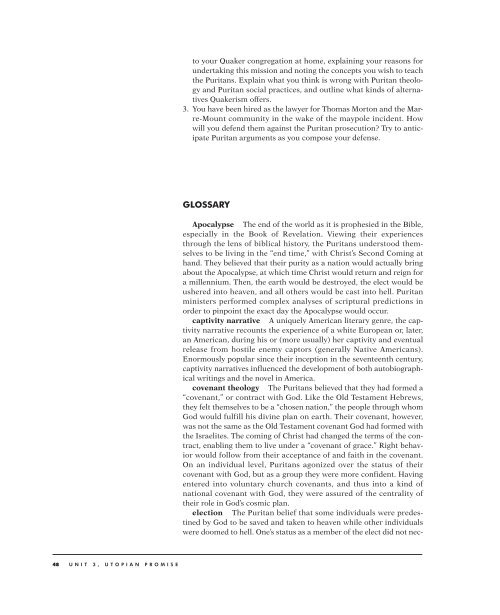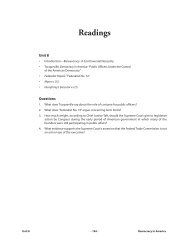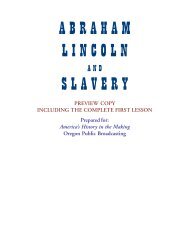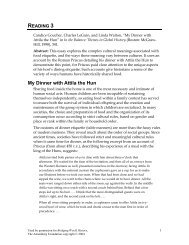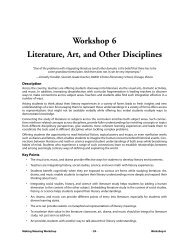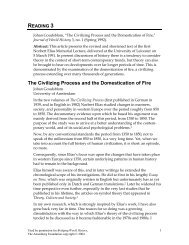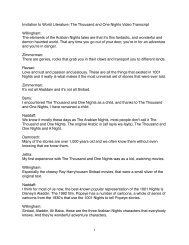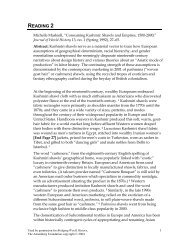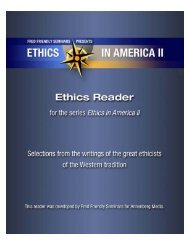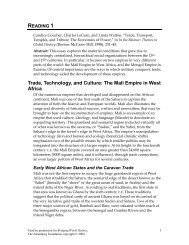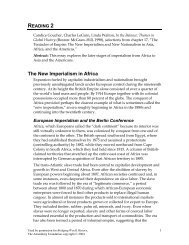UTOPIAN PROMISE - Annenberg Media
UTOPIAN PROMISE - Annenberg Media
UTOPIAN PROMISE - Annenberg Media
You also want an ePaper? Increase the reach of your titles
YUMPU automatically turns print PDFs into web optimized ePapers that Google loves.
48 UNIT 3, <strong>UTOPIAN</strong> <strong>PROMISE</strong><br />
to your Quaker congregation at home, explaining your reasons for<br />
undertaking this mission and noting the concepts you wish to teach<br />
the Puritans. Explain what you think is wrong with Puritan theology<br />
and Puritan social practices, and outline what kinds of alternatives<br />
Quakerism offers.<br />
3. You have been hired as the lawyer for Thomas Morton and the Marre-Mount<br />
community in the wake of the maypole incident. How<br />
will you defend them against the Puritan prosecution? Try to anticipate<br />
Puritan arguments as you compose your defense.<br />
GLOSSARY<br />
Apocalypse The end of the world as it is prophesied in the Bible,<br />
especially in the Book of Revelation. Viewing their experiences<br />
through the lens of biblical history, the Puritans understood themselves<br />
to be living in the “end time,” with Christ’s Second Coming at<br />
hand. They believed that their purity as a nation would actually bring<br />
about the Apocalypse, at which time Christ would return and reign for<br />
a millennium. Then, the earth would be destroyed, the elect would be<br />
ushered into heaven, and all others would be cast into hell. Puritan<br />
ministers performed complex analyses of scriptural predictions in<br />
order to pinpoint the exact day the Apocalypse would occur.<br />
captivity narrative A uniquely American literary genre, the captivity<br />
narrative recounts the experience of a white European or, later,<br />
an American, during his or (more usually) her captivity and eventual<br />
release from hostile enemy captors (generally Native Americans).<br />
Enormously popular since their inception in the seventeenth century,<br />
captivity narratives influenced the development of both autobiographical<br />
writings and the novel in America.<br />
covenant theology The Puritans believed that they had formed a<br />
“covenant,” or contract with God. Like the Old Testament Hebrews,<br />
they felt themselves to be a “chosen nation,” the people through whom<br />
God would fulfill his divine plan on earth. Their covenant, however,<br />
was not the same as the Old Testament covenant God had formed with<br />
the Israelites. The coming of Christ had changed the terms of the contract,<br />
enabling them to live under a “covenant of grace.” Right behavior<br />
would follow from their acceptance of and faith in the covenant.<br />
On an individual level, Puritans agonized over the status of their<br />
covenant with God, but as a group they were more confident. Having<br />
entered into voluntary church covenants, and thus into a kind of<br />
national covenant with God, they were assured of the centrality of<br />
their role in God’s cosmic plan.<br />
election The Puritan belief that some individuals were predestined<br />
by God to be saved and taken to heaven while other individuals<br />
were doomed to hell. One’s status as a member of the elect did not nec-


